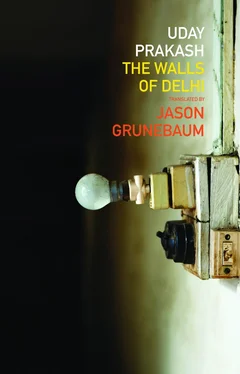‘Hey blindy, why all the tears? I’m not about to kick the bucket yet. First I am going to attend Devdas’s wedding, then send Sharda off to her new husband. After that, I can die. Stop crying!’
He touched his hand to his wife’s head.
‘Bring me the whittler and some bamboo.’
***
(Let’s stop here for a minute. I bet you’re thinking that I’m taking advantage of the one hundred and twenty fifth anniversary of the birth of Premchand, the King of Hindi Fiction, to spin you some hundred-and- twenty- five-year-old story dressed up as a tale of today. But the truth is that the account I am putting before you, in its old and backward style, manner, and language, is a tale of a time right after 9/11, in the aftermath of the collapse of the World Trade Center in New York; a time when two sovereign Asian nations were reduced to ash and rubble. It’s a tale of a time when anybody worshipping any gods other than the god of the US and Europe were called fascists, terrorists, religious fanatics. Gas and oil, water, markets, profit, plunder: to get all of this, companies, governments, and armies were killing innocent people every day all over the world.
A time when, if you looked closely, you’d notice that everyone in power was a clone of one another, when everyone was consuming the same brands, drinking the same drinks, eating the same foods, driving the same cars made by the same car companies, bank account in the same kinds of banks. Everyone had the same kind of ATM card in their pocket and same mobile phone in their hands. They got drunk on the same booze, and you could see them on page three of the newspaper on any of the TV channels from 1 to 70, soused, naked, outrageous. Look closely and you’ll notice they all have the same skin tone and speak the same language.)
***
The colour was totally washed out of Mohandas’s blue jeans and checked shirt, and both were covered with patches Kasturi had sewn on. Kaba left his bed only if he had to answer the call of nature, but otherwise slept day and night, coughing and spitting up phlegm. Putlibai groaned incessantly from the pain of her rheumatism. And yet when they were in the presence of their grandchildren, Devdas and Sharda, the rickety frames of grandmother and grandfather overflowed with life and tenderness and devotion to the little ones. Devdas jumped up and down on his baba Kaba’s cot while little Sharda stubbornly stuck to her aaji Putlibai’s lap and horsed around.
That day Mohandas and Kasturi were busy weaving bamboo mats, bamboo pith helmets, and little purses woven from bamboo. They’d received such an enormous order from Vindhyachal Handicrafts — Mohanlal Marwari’s shop — that for the past ten or twelve weeks they’d done nothing but try to finish it. Kaba and Putli looked after the children. The order was for fifty mats, fifty hats, and thirty purses. Kaba got up from his cot when his cough wasn’t rendering him immobile and helped husk the bamboo; it was an ancient craft, and he had a lot of experience. Kasturi wove the mats as if her fingers were working a machine. Four-and-a-half year old Devdas had put a hat over his head and with a bamboo stick in hand was driving two-year-old Sharda as if she were a goat, shouting, ‘hurry up, get along!’; wee Sharda in turn crawled on all fours as best she could from one corner of the room to the other. Just then there was a knock on the door. It was Kasturi’s brother-in-law, Gopaldas, who, leaning his bike against the wall, came inside. He worked as a saw operator at Narmada Timber and Furniture at the bazaar, and the owner also sent him on errands to collect various small debts.
Kasturi was delighted to see Gopaldas. It had been a long time since a visitor had come from a village near her home. After offering him something to drink and sharing a smoke, Gopal told Mohandas that he’d been at the Oriental Coal Mines three days ago on business. While there, he found out that Bisnath from Bichiya Tola had been working there under the name of Mohandas for the past five years as deputy depot supervisor, earning more than ten thousand a month. Gopaldas also found out that Bisnath’s father Nagendranath had gone to the clerk in the recruitment office and wrangled Mohandas’s employment letter out of him, then given it to his wayward son. Bisnath took advantage of the fact that the transcripts and diploma Mohandas had brought at the time of his interview didn’t have his photos on them, so he presented himself as Mohandas, and put his own photos where Mohandas’s photos would have been, then went to court and had all the documents notarised by the gazetted officer. Bisnath had transformed himself into Mohandas, son of Kabadas, caste Kabirpanthi Vishwakarma, and was taking home ten thousand a month as deputy depot supervisor, a position he filled with great confidence.
Gopaldas had seen Bisnath near the mine at a food stall drinking chai. He saw the plastic ID card hanging around his neck: it was Mohandas’s name, but Bisnath’s photo. And on top of that, everyone drinking chai with him was calling him ‘Mohandas.’
What’s more, Bisnath had left his home in Bichiya Tola village four years ago and had moved with his entire family to the workers quarters, called Lenin Nagar, where his wife made more than a few rupees with her own small time loan sharking; she also ran a shady chit fund. It was bizarre how all Bisnath’s fellow workers called him ‘Mohandas’ and his wife Amita ‘Kasturi Madam.’ Bisnath had not, like Mohandas, earned a BA, but rather was a tenth-grade drop-out; so rather than doing any work in the mine, he spent his time arse-kissing managers, skimming whatever coal he could, and busying himself with union politics.
Mohandas’s mind was spinning as he heard what his brother-in-law was telling him. How could this happen? Even if the world’s turned upside-down, how can one man become another? And like this, out in the open, in broad daylight? And not just for the afternoon, temporarily, but for four whole years? And yet, in his poverty and powerlessness, Mohandas — given the days that he’d seen and the old stories he’d heard from Kaba about his own life — began to feel as if the officers and the hakims and the wealthy and the party members were so powerful, they could turn anything into anything: a dog into an ox, a pig into a lion, a ditch into a mountain, a thief into a gentleman. Mohandas could hardly catch his breath. O guru, what kind of time are we living in when not one person in four long years has been able to step forward and say that the man working at the Oriental Coal Mines who calls himself Mohandas and earns ten thousand a month isn’t Mohandas, but Bisnath; that his father isn’t Kaba, he’s Nagendranath, his wife isn’t Kasturi, it’s Amita Bhardwaj, his mother isn’t Putlibai, but Renukadevi, who isn’t from Purbanra village, but lives in Bichiya Tola? Who doesn’t have a BA, but who dropped out of tenth grade?
Mohandas lost focus that day and kept stopping weaving the mats. His gaze wandered off and he became lost in thought. His hands slipped as he wove the bamboo, and he nearly cut his thumb with the sickle. Katuri kept an eye on him the whole time, knowing exactly the kind of roiling was going on inside. She took the knife from his hand and said, ‘The sun’s a bit much today, why don’t you wash up and have a rest?’
The next morning Mohandas caught the seven o’clock bus and set off for the Oriental Coal Mines. The night before he couldn’t sleep. The bus arrived at the mine at half past ten.
Who could he go talk to? That was the first problem. He didn’t know anyone. On top of that, the way he looked would make it hard for people to believe that he was the real Mohandas who’d graduated with a BA at the top of his class at M.G. College, and whose photo just a few years ago was in the newspaper. Another problem was that he didn’t have any copies of the newspaper, and therefore wouldn’t be able to point to the photo and say, ‘Look, that’s me, Mohandas, son of Kabadas, resident of Purbanra, district Annuppur, Madhya Pradesh, the one who a few years ago got his BA at M.G. Degree College, the one who graduated at the top of his class and was number two in merit. See the resemblance? It’s me, Mohandas!’
Читать дальше










